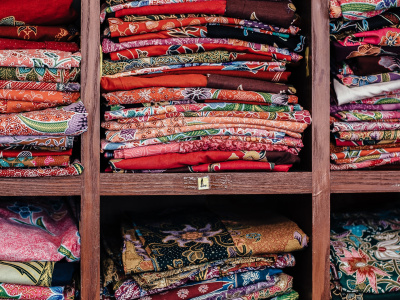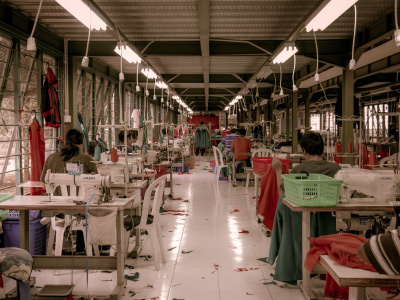
Promoting a just transition to a circular economy

Authors
Impact story – Last updated 2 August 2024
Creating a circular economy can help us minimise our environmental footprint and operate within planetary boundaries, while creating new economic opportunities. That is why the EU wants to move away from a linear economy towards a more circular system, which is a key building block of the European Green Deal.
But a circular economy transition in the EU and its member states will also impact countries outside of Europe, as the EU economy is inextricably linked to the global economy through global supply chains and international trade. This means that changing consumption and production patterns in the EU have environmental, social and economic repercussions for the rest of the world, particularly low- and middle-income countries (LMICs).
As a successful circular economy transition is one that is just, guided by the need to protect the health of the planet and the rights of all its inhabitants, the EU will need to take into account the effects of its circular economy policies on other countries.
In this impact story, we explain what ECDPM has done to promote the integration of external dimensions in the circular economy agenda, and how ECDPM can add value as a sounding board and a facilitator amongst public and private actors, between Europe and Africa.
We have particularly looked at the textiles value chain, given the EU is the largest importer of clothing globally, and the value chain is rife with environmental and human abuses.
countries that act as a market for recyclable and reusable materials generated in the EU will also be impacted by the EU’s transition towards a circular economy.

What we have achieved in the past five years
Circular and Sustainable Textiles
Insights for an EU strategy for fair and sustainable textiles
The textile industry has become a significant contributor to global greenhouse gas emissions and waste generation and has been associated with serious human rights violations. The EU had put in place policies to address these sustainability challenges, but these policies were limited, scattered, and varying in relevance to textile value chains.
2019
In December 2019, at the request of a group of civil society organisations (CSOs), we published a paper looking at what an integrated EU strategy for textiles could look like. The paper assessed various policy measures and explored how the EU can enhance synergies between different policy areas. It received positive feedback from various EU institutions, including officials from DG ENVI, who are holding the pen for the revision of the environment-related strategies. Following this project, we moderated a discussion between representatives from the private sector and civil society in the textile sector about the different policy measures and ways to collaborate.
2020
In March 2020, the European Commission, in its new circular economy plan, announced its plan to develop a ‘comprehensive strategy’ to promote sustainable textile value chains. In April 2020, over 60 civil society organisations joined forces and launched their own proposal for a European strategy for sustainable textile, garments, leather and footwear. We led the consultative process, gathering reflections from different stakeholders and providing insights based on our paper. The proposal was supported by more than 50 MEPs.
2021
In the margins of the EU-Africa Summit 2021, the 7th EU Africa Business Forum (EABF) took place in a hybrid format in Brussels in February. We partnered with Gatsby Africa to host a session at the Forum on exploring circularity in fashion and apparel trade and investments within African and EU Partnerships. The session provided an opportunity for public-private dialogue on ways to promote an inclusive circular economy transition in textiles in Africa and Europe, including through the use of new technologies.
Identifying impacts for EU’s trading partners: case of Kenya
On 30th March 2021, the EU published its strategy for sustainable and circular textiles. We wrote a commentary on how the strategy, albeit ambitious, fell short of thoroughly incorporating external dimensions, to tackle both environmental and social abuses in the textiles supply chain. In collaboration with Gatsby Africa, we began a project exploring the impacts of the strategy on EU’s trading partners, focusing on Kenya.
2022
In May 2022 we organised a workshop in Nairobi to explore circular economy opportunities in textile trade between the EU and Kenya. ECDPM provided insights into circular economy-related EU policy measures for textiles and allowed stakeholders from the public and private sector from Kenya and the EU to present examples of innovative circular textile initiatives and explore ways to promote such developments. Participants were particularly pleased with the opportunity to discuss pertinent issues with relevant actors in the same room, such as recyclers and textile producers, and appreciated our presentation in succinctly communicating upcoming policies from the EU.
Based on our findings from Kenya, we wrote an article in October 2022 on Kenya’s potential for sustainable textiles, given the changing market conditions in the EU. The article was also published in Revolve magazine, a quarterly international magazine about sustainable issues, which has a large readership. We received positive feedback on the article, in particular from sustainable inclusive business and we were invited to present our findings at the annual Circular Economy Africa Conference in November.
2023
Building on our research and findings from Kenya, we published a paper in April 2023 looking at the opportunities for circular economy transition in the textile sector in Kenya. We explored different pathways for Kenya to move towards circular textiles and ways in the EU can support the transition. In June, we presented our findings in a public webinar and provided space for stakeholders from Africa and Europe to discuss the opportunities and challenges for textile businesses.
2024
In April 2024, ECDPM presented its findings in an internal BMZ Expert Discussion on EU Textile Strategy to raise awareness among relevant BMZ units about the EU Textiles Strategy and the implications of it for BMZ’s partner countries. We provided input in discussions on potential areas of work and recommendations for BMZ.
Get in touch
If you would like to work with us on policy coherence or have any questions, please get in touch with Nadia Ashraf or Eunike Spierings – they would be happy to tell you more.








